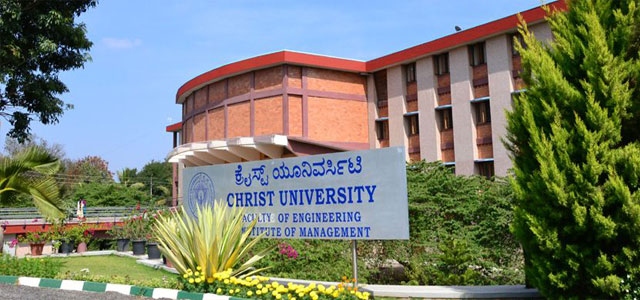CHRIST UNIVERSITY MSC MATHEMATICS COURSE OVERVIEW
The postgraduate course focuses on the technical and practical aspects of the fundamentals of Mathematics and includes theories and concepts of counting, structure, probability, permutations and combination, calculation, measurement, and study of shapes and motions. It is an interdisciplinary subject involving Algebra, Probability, Statistics, and Geometry. It covers topics related to applied Mathematics, biostatics, geometry, graphs, and data representation. Candidates will have diverse knowledge about the diverse applications of numbers and calculations after successful completion of the course.
The course aims to develop mathematical ability and abstract reasoning in students. The course is strengthened further by a strong academic foundation, experienced faculty, and excellent infrastructure. The Placement Cell encourages fresh talent and provides multiple career opportunities in top companies and organizations.
Candidates who take up the MSc Mathematics course in Christ University Bangalore will have diverse knowledge about the multiple applications of applied Mathematics and ideas to to overcome relevant challenges.
Skills like project management, logical reasoning, team work, planning and execution, organization, analytical reasoning, decision-making are enhanced through tools like case studies, presentations, webinars, seminars, internships, projects, workshops, and guest lectures included in MSc Mathematics in Christ University.
DURATION OF MSC MATHEMATICS COURSE IN CHRIST UNIVERSITY
- 2 years (4 semesters)
- Full time, Postgraduate Programme
AFFILIATION & APPROVALS
- Government of India
- Deemed-to-be University
- Accredited by NAAC
- Approved by UGC
PROGRAM OBJECTIVES
- To provide a strong foundation in Mathematics and its many applications
- To create graduates who can analyze real-time problems by applying continuous reflective learning techniques
- To provide practical experience and exposure so that candidates can design and develop immediate solutions through scientific integrity and objectivity
- To provide an environment of adaptability and continuous learning
- To develop and enhance skills like analysis, problem-solving, and leadership
- To integrate the concepts of professional, ethical, and social values to ensure quality research and develop solutions to social problems
- To understand the necessity of the judicious use of technology for the benefit of the society and environment
- To enhance competency and employability
PROGRAM OUTCOME OF CHRIST UNIVERSITY MSC MATHEMATICS
- Graduates with the ability to understand and apply the fundamental concepts of Mathematics and its many applications
- Graduates who can analyze real-time problems by applying continuous reflective learning techniques
- Graduates with the ability to design and develop immediate solutions through scientific integrity and objectivity
- Graduates who can engage in adaptability and continuous learning
- Graduates who have excellent analysis, problem-solving, and leadership skills
- Graduates who can integrate professional, ethical, and social values to ensure quality research
- Graduates who can understand the necessity of the judicious use of technology for the society and environment
- Graduates who are competent and employable
ELIGIBILITY OF MSC MATHEMATICS IN CHRIST UNIVERSITY
- Minimum 50% aggregate in BCA/Bachelor’s degree with Mathematics subject from a recognized Board in India
- Candidates with final semester/year examinations in March-May 2021 are eligible to apply
IMPORTANT DATE
Admission open - 10 December 2020
Admission close - 31 May 2021
FEE STRUCTURE FOR 2021
The fees structure for MSc Mathematics in Christ University can be summarized as:
Admission Registration: ₹5000
|
Karnataka |
Other States |
NRI |
SAARC/AFRICA/ OCI/PIO/ASIAN |
Other Foreign Nationals | |
|---|---|---|---|---|---|
|
First Year (Semester I, II) |
₹45000 |
₹55000 |
₹86000 |
$ 2000 |
$ 2500 |
|
Second Year (Semester III, IV) | ₹45000 | ₹55000 | ₹86000 | $ 2000 | $ 2500 |
APPLICATION PROCESS OF MSC MATHEMATICS IN CHRIST UNIVERSITY FOR 2021
Candidates frequently wonder what is the admission procedure for MSc Mathematics in Christ University? This can be summarized as:
- The candidates must apply online when the applications are available on the University website https://appstat.christuniversity.in
- Register with Name, Email ID and Password
- Fill all the information that is required
- Submit the Application Form
- Make payment using card and click on Submit
- A 9-digit Application Number will be generated
- Applications close approximately 1 week before the scheduled selection process
- Selection Process - Application Form printout, original documents and a set of photocopies on the allotted date, time and venue mentioned on the Admit Card
Required Documents:
- Copy of Class 10, Class 11/ 12, and Degree Marks Card
- Transfer Certificate of Class 12
- Migration Certificate of Class 12 (except Karnataka state board applicants)
- Copy of valid ID proof (Aadhar Card/Aadhar Enrolment Receipt/PAN Card/Voter ID)
- PIO/OCI/SAARC/AFRICA/ASEA /OTHER FOREIGN NATIONALS Categories must send the required supporting documents – Copy of Passport, Copy of PIO/OCI Card, Copy of Degree Marks Cards)
- Baptism Certificate from the Parish Priest/Pastor for Karnataka Christian Students
- Recent passport size photograph (with white background)
ADMISSION FOR INTERNATIONAL STUDENTS
- The International Student Category includes Foreign Citizens/PIO Card Holders/OCI (Dual Citizens)
- The candidates from non-English speaking countries should produce evidence of passing the qualifying examination in English medium or have IELTS score 6.0/TOEFL (paper) 550/TOEFL (computer) of 213/TOEFL (IBT) of 79 scores
- Application Process – Direct Mode Application/Online Application Form
- The candidates will have to pay the International Student Category Fee
ADMISSION FOR NRI STUDENTS
- The candidates will have to pay the NRI Fee
- Foreign Venues for Selection Process: Kuwait and Dubai (UAE) and Doha (Qatar)
- Admission is based on academic performance and Selection
ADMISSION PROCESS FOR MSC MATHEMATICS IN CHRIST UNIVERSITY FOR 2021
Candidates frequently ask what is the admission process for the MSc Mathematics programme at Christ University Bangalore? The Admission Process includes:
- Selection Process: Christ University Entrance Test (CUET), Skill Assessment, Personal Interview, and Academic Performance of Class 10, Class 11/12, and Degree
- Selection Process results will be available on https://appstat.christuniversity.in
- Selected candidates will receive an E-Admission Letter
- The candidates must choose the preferred date and time from available options for the Admission Process
- The Fee payment has to be made through the online mode
- Presence of the candidate, original documents, and passport photograph of the candidate are mandatory
- Two copies of the Online Payment Receipt are mandatory
- All admitted students must open an account at South Indian Bank, CHRIST (Deemed to be University) Branch
MISCELLANEOUS INFORMATION
- A common question frequently asked by candidates is how can get direct admission for MSc Mathematics in Christ University? Christ University does not collect any type of Donation Fee
- If the Application Form is incomplete or incorrect, the University Management has the right to reject it
- Do not send any original documents through post or courier
- Ignorance of the Terms, Conditions and Guidelines will not be considered as an excuse
- There may be a periodic increase in Tuition Fees to meet the rise in costs
- Admitted students who require Bank Loan will be provided a recommendation letter on request
- The decision of the University Management and Admission Committee is final and binding
SYLLABUS FOR MSC MATHEMATICS IN CHRIST UNIVERSITY
| Year | Semester | Subject |
|---|---|---|
| Year I | Semester I |
|
| Semester II |
| |
| Year II | Semester III |
|
| Semester IV |
|
OPEN ELECTIVES
Odd Semester:
- Foundations of Mathematics
- Quantitative Techniques for Managers
Even Semester:
- Quantitative Aptitude for Competitive Examinations
- Open-Source Software (FOSS) Tools: (Scilab and MAXIMA)
CAREER SCOPE AFTER MSC MATHEMATICS IN CHRIST UNIVERSITY BANGALORE
There are plenty of career and job opportunities available in government and private companies and organizations for MSc Mathematics graduates.
Potential career roles are:
- Lecturer/Professor
- Mathematician
- Research Associate
- Consultant
- Banker
- Loan Officer
- Demographer
- Economist
- Statistician
- Entrepreneur
- Data Analyst
- Process Analyst
- Security Analyst
- Management Analyst
- Predictive Modeler
- Quantitative Analyst
- Auditor
Popular companies that recruit MSc Mathematics graduates are:
- HCL
- Wipro
- Oracle
- Mindtree
- Virtusa
- Accenture
- HP
- IBM
- Dell
- Intel
- Siemens
- Bosch
- Honeywell
- Apple
- ITC Infotech
- Infosys
- Cognizant
- Accenture
- IBM
The average salary package for MSc Mathematics graduates is around 2.5 LPA to 7 LPA. The salary varies according to experience, specializations, professional certifications, and skills. The lowest salary package recorded was 2.5 LPA for fresh graduates and Trainees, and the highest salary package recorded was 25 LPA for Senior Professors and Consultants.
LOCATION
Hosur Road, Bangalore

